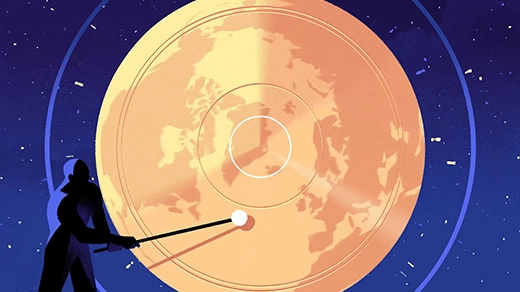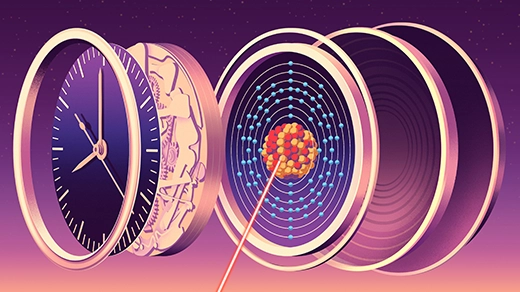The Physicist Who’s Challenging the Quantum Orthodoxy

Jonathan Oppenheim, a physicist at University College London, is developing hybrid theories that could unify classical gravity and quantum mechanics.
Philipp Ammon for Quanta Magazine
Introduction
Most physicists expect that when we zoom in on the fabric of reality, the unintuitive weirdness of quantum mechanics persists down to the very smallest scales. But in those settings, quantum mechanics collides with classical gravity in a resolutely incompatible way.
So for almost a century, theorists have tried to create a unified theory by quantizing gravity, or sculpting it according to the rules of quantum mechanics. They still haven’t succeeded.
Jonathan Oppenheim, who runs a program exploring post-quantum alternatives at University College London, suspects that’s because gravity simply can’t be squeezed into a quantum box. Maybe, he argues, our presumption that it must be quantized is wrong. “That view is ingrained,” he said. “But no one knows what the truth is.”
Quantum theories are based on probabilities rather than certainties. For example, when you measure a quantum particle, you can’t predict exactly where you will find it, but you can predict the likelihood that it will be found in a particular place. What’s more, the more certain you are about a particle’s location, the less certain you are about its momentum. Over the 20th century, physicists gradually made sense of electromagnetism and other forces using this framework.
But when they tried to quantize gravity, they ran into unnatural infinities that had to be sidestepped with clumsy mathematical tricks.
The problems arise because gravity is a result of space-time itself, rather than something that acts on top of it. So if gravity is quantized, that means space-time is also quantized. But that doesn’t work, because quantum theory only makes sense against a classical space-time background — you can’t add and then evolve quantum states on top of an uncertain foundation.
To deal with this deep conceptual conflict, most theorists turned to string theory, which imagines that matter and space-time emerge from tiny, vibrating strings. A smaller faction looked to loop quantum gravity, which replaces the smooth space-time of Einstein’s general relativity with a network of interlocked loops. In both theories, our familiar, classical world somehow emerges from these fundamentally quantum building blocks.
Oppenheim was originally a string theorist, and string theorists believe in the primacy of quantum mechanics. But he soon became uncomfortable with the elaborate mathematical acrobatics his peers performed to tackle one of the most notorious problems in modern physics: the black hole information paradox.
In 2017, Oppenheim started searching for alternatives that avoided the information paradox by taking both the quantum and the classical worlds as bedrocks. He stumbled across some overlooked research on quantum-classical hybrid theories from the 1990s, which he’s been extending and exploring ever since. By studying how the classical and quantum worlds interrelate, Oppenheim hopes to find a deeper theory that is neither quantum nor classical, but some kind of hybrid. “Often we put all our eggs in a few baskets, when there are lots of possibilities,” he said.
To make his point, Oppenheim recently made a bet with Geoff Penington and Carlo Rovelli — leaders in their respective fields of string theory and loop quantum gravity. The odds? 5,000-to-1. If Oppenheim’s hunch is correct and space-time isn’t quantized, he stands to win bucketloads of potato chips, colorful plastic bazinga balls, or shots of olive oil, according to his fancy — as long as each item costs at most 20 pence (about 25 cents).
We met in a north London café lined with books, where he calmly unpacked his concerns about the quantum gravity status quo and extolled the surprising beauty of these hybrid alternatives. “They raise all kinds of remarkably subtle questions,” he said. “I’ve really lost my feet trying to understand these systems.” But he perseveres.
“I want my 5,000 bazinga balls.”
The interview has been condensed and edited for clarity.
Why are most theorists so sure that space-time is quantized?
It’s become dogma. All the other fields in nature are quantized. There’s a sense that there’s nothing special about gravity — it’s just a field like any other — and therefore we should quantize it.

Oppenheim and his students, seen here in and around the UCL campus, are developing a new class of hybrid quantum-classical theories in which gravity stays classical. Maybe, Oppenheim argues, gravity is special and the quantum consensus is wrong.
Philipp Ammon for Quanta Magazine
Is gravity special in your view?
Yes. Physicists define all the other forces in terms of fields evolving in space-time. Gravity alone tells us about the geometry and curvature of space-time itself. None of the other forces describe the universal background geometry that we live in like gravity does.
At the moment, our best theory of quantum mechanics uses this background structure of space-time — which gravity defines. And if you really believe that gravity is quantized, then we lose that background structure.
What sorts of problems do you run into if gravity is classical and not quantized?
For a long time, the community believed it was logically impossible for gravity to be classical because coupling a quantum system with a classical system would lead to inconsistencies. In the 1950s, Richard Feynman imagined a situation that illuminated the problem: He began with a massive particle that is in a superposition of two different locations. These locations could be two holes in a metal sheet, as in the famous double-slit experiment. Here, the particle also behaves like a wave. It creates an interference pattern of light and dark stripes on the other side of the slits, which makes it impossible to know which slit it went through. In popular accounts, the particle is sometimes described as going through both slits at once.
But since the particle has mass, it creates a gravitational field that we can measure. And that gravitational field tells us its location. If the gravitational field is classical, we can measure it to infinite precision, infer the particle’s location, and determine which slit it went through. So we then have a paradoxical situation — the interference pattern tells us that we can’t determine which slit the particle went through, but the classical gravitational field lets us do just that.
But if the gravitational field is quantum, there is no paradox — uncertainty creeps in when measuring the gravitational field, and so we still have uncertainty in determining the particle’s location.
So if gravity behaves classically, you end up knowing too much. And that means that cherished ideas from quantum mechanics, like superposition, break down?
Yes, the gravitational field knows too much. But there’s a loophole in Feynman’s argument that could allow classical gravity to work.
What is that loophole?
As it stands, we only know which path the particle took because it produces a definite gravitational field that bends space-time and allows us to determine the particle’s location.
But if that interaction between the particle and space-time is random — or unpredictable — then the particle itself doesn’t completely dictate the gravitational field. Which means that measuring the gravitational field will not always determine which slit the particle went through because the gravitational field could be in one of many states. Randomness creeps in, and you no longer have a paradox.
So why don’t more physicists think gravity is classical?
Well, it is logically possible to have a theory in which we don’t quantize all the fields. But for a classical theory of gravity to be consistent with everything else being quantized, then gravity has to be fundamentally random. To a lot of physicists that’s unacceptable.

Oppenheim started out as a string theorist, but he eventually grew frustrated with the clumsy mathematical tricks his colleagues employed to get around one of the most notorious conundrums in physics: the black hole information paradox.
Philipp Ammon for Quanta Magazine
Why?
Physicists spend a lot of time trying to figure out how nature works. So the idea that there is, on a very deep level, something inherently unpredictable is troubling to many.
The outcome of measurements within quantum theory appears to be probabilistic. But many physicists prefer to think that what appears as randomness is just the quantum system and the measuring apparatus interacting with the environment. They don’t see it as some fundamental feature of reality.
What are you proposing instead?
My best guess is that the next theory of gravity will be something that is neither completely classical nor completely quantum, but something else entirely.
Physicists are only ever coming up with models that approximate nature. But as an attempt at a closer approximation, my students and I constructed a fully consistent theory in which quantum systems and classical space-time interact. We just had to modify quantum theory slightly and modify classical general relativity slightly to allow for the breakdown of predictability that is required.
Why did you start working on these hybrid theories?
I was motivated by the black hole information paradox. When you throw a quantum particle into a black hole and then let that black hole evaporate, you encounter a paradox if you believe that black holes preserve information. Standard quantum theory demands that whatever object you throw into the black hole is radiated back out in some scrambled but recognizable way. But that violates general relativity, which tells us that you can never know about objects that cross the black hole’s event horizon.
But if the black hole evaporation process is indeterministic then there’s no paradox. We never learn what was thrown into the black hole because predictability breaks down. General relativity is safe.

Recently, Oppenheim made a 5,000-to-1 bet with two colleagues that gravity can’t be quantized. If he wins, he gets to stuff his pockets with 5,000 bags of potato chips or bazinga balls or anything else that suits his fancy — as long as each item costs at most 20 pence (about 25 cents). “I feel I’ve made a pretty safe bet, even if I lose,” Oppenheim said.
Philipp Ammon for Quanta Magazine
So the noisiness in these quantum-classical hybrid theories allows information to be lost?
Exactly.
But information conservation is a key principle in quantum mechanics. Losing this can’t sit easily with many theorists.
That’s true. There were huge debates about this in recent decades, and almost everybody came to believe that black hole evaporation is deterministic. I’m always puzzled by that.
Will experiments ever resolve if gravity is quantized or not?
At some point. We still know almost nothing about gravity on the smallest scales. It hasn’t even been tested to the millimeter scale, let alone to the scale of a proton. But there are some exciting experiments coming online which will do that.
One is a modern-day version of the “Cavendish experiment,” which calculates the strength of the gravitational attraction between two lead spheres. If there is randomness in the gravitational field, as in these quantum-classical hybrids, then when we try and measure its strength we won’t always get the same answer. The gravitational field will jiggle around. Any theory in which gravity is fundamentally classical has a certain level of gravitational noise.
How do you know this randomness is intrinsic to the gravitational field and not some noise from the environment?
You don’t. Gravity is such a weak force that even the best experiments already have a lot of jiggle in them. So you have to eliminate all these other sources of noise as much as possible. What’s exciting is that my students and I showed that if these hybrid theories are true, there must be some minimal amount of gravitational noise. This can be measured by studying gold atoms in a double-slit experiment. These experiments already place bounds on whether gravity is fundamentally classical. We are gradually closing in on the amount of indeterminacy allowed.
On the flip side of the bet, are there any experiments that would prove that gravity is quantized?
There are proposed experiments that look for entanglement mediated by the gravitational field. As entanglement is a quantum phenomenon, that would be a direct test of the quantum nature of gravity. These experiments are very exciting, but probably decades away.




